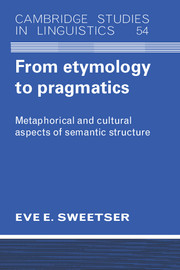Book contents
5 - Conditionals
Published online by Cambridge University Press: 05 June 2012
Summary
Conditionals are a highly controversial subject in current linguistic analysis. This chapter is intended to show how if–then conjunction fits into the framework I have described in the preceding chapters, rather than to propose any full theory of conditionals. My analysis will often support some particular view of the phenomenon of conditionality, rather than another, or suggest motivations for previously proposed analyses. But the main object will be simply to elucidate the functioning of conditionality in the content, epistemic, and speech-act domains.
Conditionals in three domains
Content conditionals
The first step is an examination of “real-world” or content-domain conditionals. It has often been observed (see Austin 1961; Haiman 1978, 1986; Comrie 1986) that the natural-language use of conditionals is not in fact identical with the conditionality defined by logical if–then (⊃). Most obviously, speakers of natural languages reject as bizarre whole classes of logically well-formed and “true” conditionals such as (1):
(1) If Paris is the capital of France, (then) two is an even number.
Logically, a conditional is only false if the antecedent is true but the consequent is false. But natural-language speakers apparently require more than the appropriate truth values in order to accept a conditional as well-formed: they require a connection between the two clauses. Natural language uses conditionals to talk about related things.
- Type
- Chapter
- Information
- From Etymology to PragmaticsMetaphorical and Cultural Aspects of Semantic Structure, pp. 113 - 144Publisher: Cambridge University PressPrint publication year: 1990



